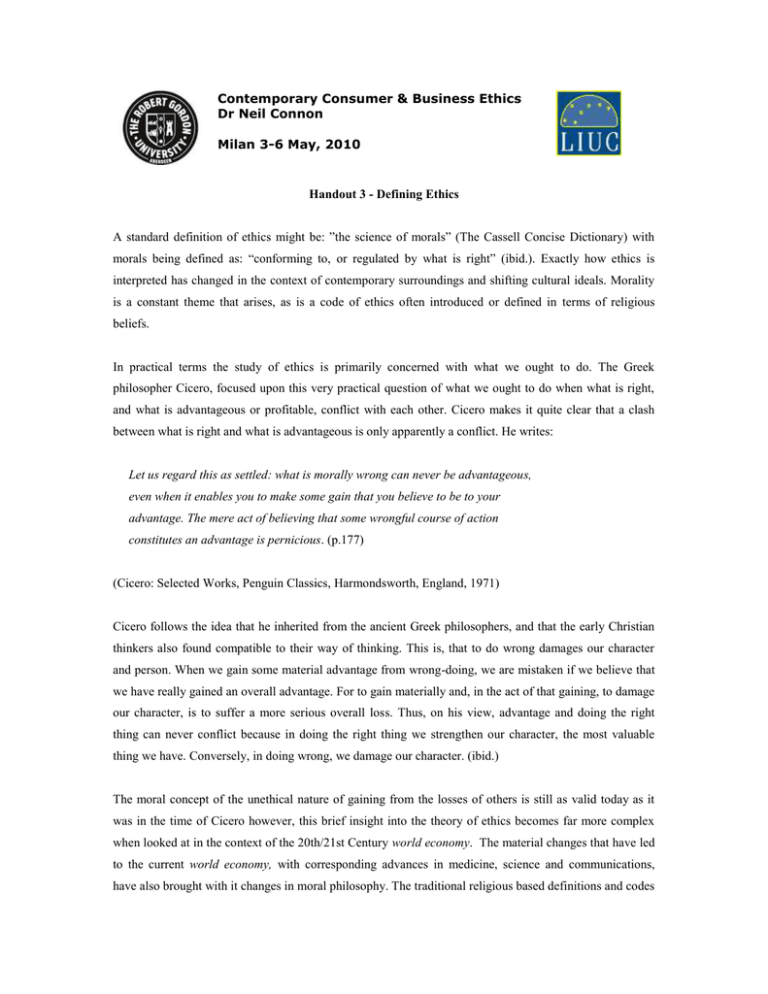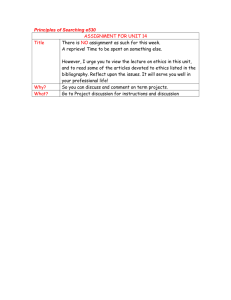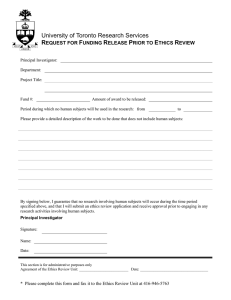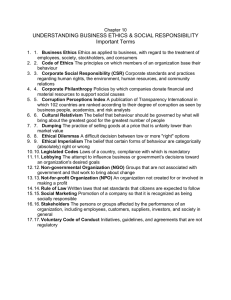Contemporary Consumer & Business Ethics Dr Neil Connon Milan 3-6 May, 2010
advertisement

Contemporary Consumer & Business Ethics Dr Neil Connon Milan 3-6 May, 2010 Handout 3 - Defining Ethics A standard definition of ethics might be: ”the science of morals” (The Cassell Concise Dictionary) with morals being defined as: “conforming to, or regulated by what is right” (ibid.). Exactly how ethics is interpreted has changed in the context of contemporary surroundings and shifting cultural ideals. Morality is a constant theme that arises, as is a code of ethics often introduced or defined in terms of religious beliefs. In practical terms the study of ethics is primarily concerned with what we ought to do. The Greek philosopher Cicero, focused upon this very practical question of what we ought to do when what is right, and what is advantageous or profitable, conflict with each other. Cicero makes it quite clear that a clash between what is right and what is advantageous is only apparently a conflict. He writes: Let us regard this as settled: what is morally wrong can never be advantageous, even when it enables you to make some gain that you believe to be to your advantage. The mere act of believing that some wrongful course of action constitutes an advantage is pernicious. (p.177) (Cicero: Selected Works, Penguin Classics, Harmondsworth, England, 1971) Cicero follows the idea that he inherited from the ancient Greek philosophers, and that the early Christian thinkers also found compatible to their way of thinking. This is, that to do wrong damages our character and person. When we gain some material advantage from wrong-doing, we are mistaken if we believe that we have really gained an overall advantage. For to gain materially and, in the act of that gaining, to damage our character, is to suffer a more serious overall loss. Thus, on his view, advantage and doing the right thing can never conflict because in doing the right thing we strengthen our character, the most valuable thing we have. Conversely, in doing wrong, we damage our character. (ibid.) The moral concept of the unethical nature of gaining from the losses of others is still as valid today as it was in the time of Cicero however, this brief insight into the theory of ethics becomes far more complex when looked at in the context of the 20th/21st Century world economy. The material changes that have led to the current world economy, with corresponding advances in medicine, science and communications, have also brought with it changes in moral philosophy. The traditional religious based definitions and codes of ethics that dominated western society for many hundreds of years have been joined in the debate by other theories. The most prominent of these is existentialism. This theory espouses the individual and the freedom we all possess to be ourselves. The theory, or movement, of existentialism is complex and multi-faceted, but is held together by the idea that ‘existence is the only concrete thing, the rest is mere abstraction’. (Lundin p. 379) The existentialist therefore looks at life, ethics and decision making in a narrower context, and will not feel the same restraints as, for instance, those who hold religious beliefs might about how their earthly actions will effect them in the after life. This research does not aim to deliberate over ethical theories, however they do provide some insight into the actions of people and the thought processes behind their actions. In the context of this research, does it become an easier moral problem to resolve when the relationship is so distant as occurs in our modern economy? Do we care less, or not at all, when there is no possibility of meeting the person who is worse off for our gain, face to face? And does the expectation of eternal life based on religious views influence the way people act in normal life? In identifying how the common person perceives ethics in their personal consumption they are likely to be driven by a personal moral code that is itself derived from; external factors such as experience, education, upbringing and religion; and internal factors such as personal characteristics. As part of the external factors the individual is likely to react to environmental changes, such as how the common culture responds to ethical issues, and how strongly or otherwise the individual feels compelled to conform to the common culture (see 1.10). Ethics and Culture In an historical context ‘…Burke suggests that the modern idea of popular culture is associated with burgeoning forms of national consciousness (emerging) in the late eighteenth century, and resides in the attempt by intellectuals to construct popular culture as national culture’ (Strinati p2.). In looking at a culture, whether it be called popular or national, the collective consciousness is more apparent today than it ever was in the past, moulded together by media, information access and the age old desire to belong. Culture has also been greatly influenced by the process of globalisation. Since the 1960’s it is evident that ‘substantial qualitative as well as quantitative economic changes (have begun) to emerge’. (Dicken, P., p.19) The qualitative, mentioned by Dicken, have been especially important and influential in that the ties between countries are far deeper than they ever were in the past. Judging economies individually today would be difficult as they have a great dependency on other economies. This has had a major impact on culture and brought about the emergence of western culture as a particular and identifiable expression of the collective nature of those countries seen as western. Some of the issues Strinati looks at with regards to the forming of culture are: where does it come from? does it emerge from the people themselves as an autonomous expression of their interests and modes of experience, or is it imposed from above by those in positions of power as a type of social control? (Strinati p3.) In identifying where ethics lays in the common consciousness, and the direction in which it is likely to go, we need to be aware of what, if anything, is driving it to become an issue of real importance. If concerns over ethics are becoming more a part of national culture then this is likely to affect spending patterns, and production patterns, and therefore impact on this research. Changing Ethics and/or perceptions There is considerable evidence that most western markets have been affected by green consumer behaviour, that means by behaviour that reflects concern about the effects of manufacturing and consumption on the natural environment. (Wagner p1.) Besides legal changes, over the past decade many companies began to feel the impact of market forces, such as changing buying habits of environmentally orientated consumers and boycotting behaviour that resulted from media reporting and pressure group activity (ibid). If consumers have had their perceptions and therefore behaviour, changed by environmental issues it is probable that ethics can play a similar role in constituting changing patterns of consumption. When special reports appear in magazines such as Good Food asking, ‘...ethical food, the next big thing’ (April 1999), then this suggests that even if ethics have not changed per se, it is beginning to be highlighted as an issue of importance. As awareness of this increases it will lead to changes in consumer behaviour driven by cultural change.


